Best Cities To Live In Mexico In 2026
Mexico remains one of Latin America’s most compelling destinations, especially for North Americans. More than a million expats call it home, and tens...

7 min read
Have you ever wondered which countries are the richest in the world? It’s not an easy question to answer. The first economic indicator people usually look at is Gross Domestic Product (GDP). If GDP alone is our guide, then the richest countries are the United States, China, Germany, Japan, and India. However, the picture changes once you consider ordinary citizens. Most Chinese and Indian people would not describe their daily lives as very prosperous. In some countries, everyday people actually enjoy more purchasing power than the average American, Japanese, or German.
Although imperfect, the most effective way to compare people’s wealth across countries is not through stock markets or government budgets, but through Purchasing Power Parity (PPP). PPP is a method for comparing real wealth across countries by adjusting income for local prices. The term “per capita” simply means “per person,” so PPP income per capita measures the average income each individual has, after accounting for the cost of living in their country. For example, $1,000 USD per month would not begin to cover rent in New York City. However, it could cover housing, food, and transportation with money left over in Paraguay or Colombia. This adjustment shows not just what people earn on paper, but what their income can actually buy—the real wealth in their pockets.
With this lens, a handful of small nations rise to the top, driven by finance, energy, technology, and trade. In this article, I’ll walk you through the ten richest countries in the world, ranked by PPP per capita.
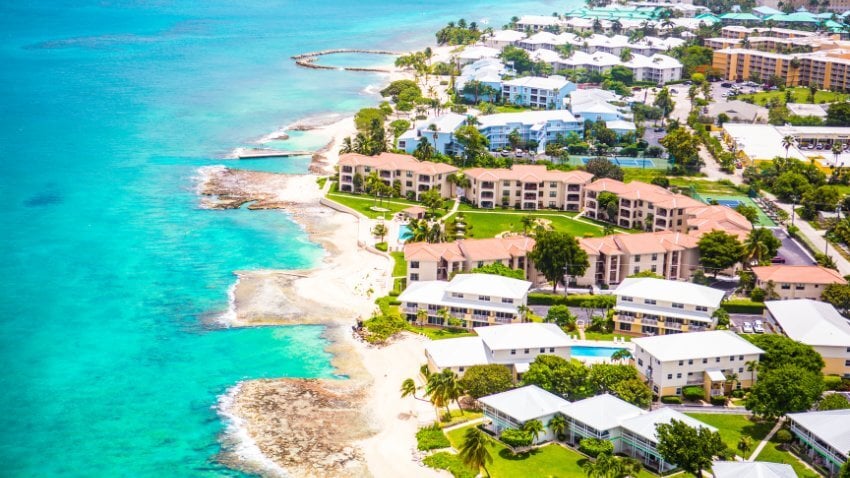
A Caribbean paradise turned financial powerhouse — the Cayman Islands thrive on finance, tourism, and real estate, offering no income tax and a high $87,000 PPP per capita amid soaring living costs
The Cayman Islands are a British Overseas Territory in the western Caribbean and are known as a popular tax haven. Since the government doesn’t impose any direct taxes on personal income, corporate earnings, capital gains, or inheritance, the islands are highly attractive to multinational corporations and high-net-worth individuals. Seeking the best jurisdictions for tax planning and asset protection.
The Cayman Islands transformed from a small seafaring community in the 1960s into one of the world’s top offshore financial centers. Today, its economy is driven by financial services, tourism, and real estate, with a PPP per capita of about $87,000 USD. This high income level places the Cayman Islands among the richest territories in the world. Modern infrastructure, political stability under British rule, and a well-regulated financial system make it a secure and comfortable place to live.
Although the Cayman Islands offer an enviable lifestyle with its tropical weather, modern amenities, and no direct tax, the paradise has a price. The cost of living is extremely high because of imports and the limited housing supply. Bureaucracy, though lighter than in most Western countries, can still slow down business registration and immigration paperwork.
Though not widely known, Brunei is certainly one of the world’s wealthiest nations. This tiny monarchy, rich in oil and natural gas like Qatar, lies not in the Middle East but in Southeast Asia. Its independence was preserved under British protection from 1888 to 1984, without which the country might have vanished from history. Today, Brunei is a developed nation with a PPP per capita of around $90,000 USD.
Expats may appreciate Brunei’s lack of income tax, modern infrastructure, and safe environment. However, they should also keep in mind that many civil liberties taken for granted elsewhere are restricted here.

Neutral and innovative, Switzerland turned precision, trade, and finance into wealth. With a $94,000 PPP per capita, low taxes, and stability, it ranks among the richest yet most expensive nations on Earth
Switzerland is one of those rare countries that, despite its small size and lack of natural resources, seized the power of modernity early on and built an industrious nation through free trade and industrialization. Its defining trait, neutrality, spared it from the devastation of major wars and laid the foundation for its renowned banking sector and tradition of financial secrecy. It’s no surprise that Switzerland’s PPP per capita stands at approximately $94,000 USD.
Depending on their priorities, expats may find life in Switzerland highly appealing. The tax burden is far lower than in most European countries, and economic freedom is both respected by society and safeguarded by the government. However, Switzerland is also one of the most expensive countries in the world, and its multilingual society can be challenging for some to handle.
Related content: Why Is Switzerland So Expensive?
Norway is a small, educated, democratic, and outward-looking country in northern Europe. Its industrial economy was doing fine on its own, but the discovery of natural gas turned the country into an energy giant. Instead of unleashing private wealth, politicians funnelled the bonanza into the Government Pension Fund Global, a massive state-controlled fund that props up the welfare state. The PPP per capita in Norway is around $101,000 USD.
Despite some positive qualities, Norway ranks relatively low on the list for most expats. With a marginal income tax rate of about 55% and steep living costs, many expats find the burden hardly worth enduring Norway’s long, dark, and frigid winters. Expats would also be disappointed with the cultural uniformity established in even the big cities of Norway.
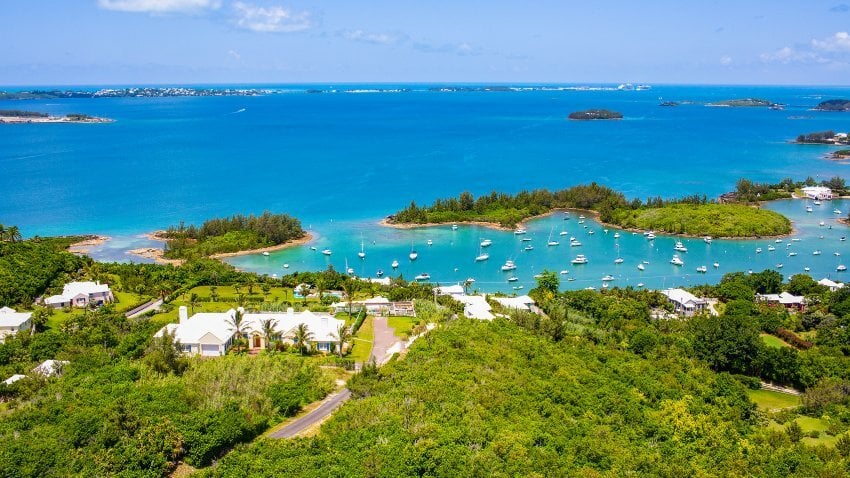
Bermuda blends tropical beauty with financial power. A global hub for insurance and finance, it offers zero corporate taxes and a $120,000 PPP per capita under stable British governance
Bermuda is another island nation that owes its prosperity not to natural resources but to financial ingenuity as a tax haven. As the oldest British Overseas Territory, its transformation also started in the early 1960s, from being a fishing community into an international financial services hub, particularly for insurance and reinsurance. Because there is no corporate income tax, capital gains tax, or withholding tax in Bermuda, the island is popular among international businesses and HNWIs.
Located in the North Atlantic, this beautiful island is also known for its pink-sand beaches and blue waters. Since the island’s economy is fueled by insurance, financial services, and tourism, it has a PPP per capita of around $120,000 USD. Bermıda has a stable political system under British oversight, a strong legal framework based on English common law, and world-class infrastructure. All of these qualities make it a secure base for international operations.
Qatar’s story of economic development is somewhat typical of the Arabian Peninsula, since its wealth is dependent on rich oil and natural gas reserves. However, Qatar's small population distinguishes it from some other oil-rich Middle Eastern countries. Being a member of the founding tribes can make you rich by birth. Even if you are not ‘royal’, redistribution of resource wealth among citizens can provide you with a comfortable life in Qatar. Considering the PPP per capita is around $126,000 USD, the advantages of Qatar's natural resources are impressive.
Although geopolitical and economic turbulence may overshadow the Middle East’s charm, Qatar’s flat tax system, fixed at 10%, modern infrastructure, and relatively easy access to Europe may attract expats.
Many may find Macau's economic transformation quite interesting. Its history as a small fishing village underwent rapid change when the Portuguese occupied the island and transformed it into a trading hub in the 17th century. However, Macau shifted its focus to gaming tourism in the 19th century with the rise of Hong Kong. Macau, which became a Chinese Special Administrative Region in 1999, liberalized its casino sector by removing its monopoly on gaming, readjusting its economy to become a global player. Macau's casinos have long attracted wealthy VIP bettors. Many billionaires and ultra-high-net-worth individuals, particularly from mainland China and other parts of Asia, continue to prefer Macau for gaming purposes.
Although Macau, as an island state, differs from other finance sector-centred super-rich nations, its PPP per capita is impressive at around $128,000 USD. Despite being a low-tax country, Macau is not your typical expat destination.
Another small island nation, Ireland, had a poor, agricultural, and protectionist economy that was struggling to stop a massive population outflow. Its destiny turned around upon joining the European Economic Community in 1973, as it liberalized its economy, adopted free trade, and attracted direct foreign investment. The wave of globalization following the collapse of the Soviet Union led Ireland to build its economic growth into a remarkable success story. With its expanding service sector, Ireland has become a hub for many multinational corporations seeking to execute their European operations. Now, PPP per capita is around $131,000 USD, an amazing accomplishment for ordinary Irish people, considering PPP was around $3,500 USD in the 1950s.
Although Ireland is one of the best places for corporations, particularly for those managing operations in Europe, its progressive income taxes are breaking the spell for most expats. Nevertheless, Ireland is a living example of what global free trade can achieve when it is connected with good governance.
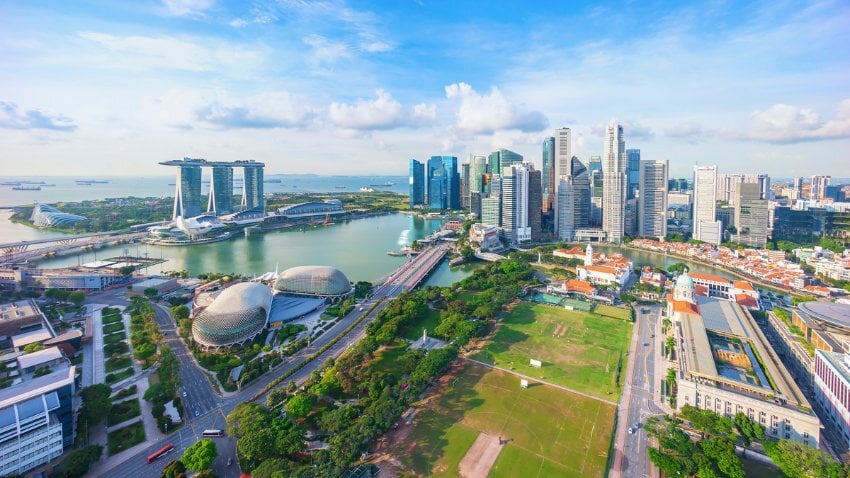
From trading post to global powerhouse, Singapore leads the world in wealth with a $150,700 PPP per capita. Built on trade, finance, and innovation, it thrives on efficiency, stability, and opportunity
Singapore has transformed into Asia’s premier hub for finance, trade, and innovation, having evolved from a modest trading post. It all happened within a single generation, expanding from poverty to becoming the wealthiest country on earth. Its PPP per capita is around $150,700 USD. Considering the time frame, this is unbelievable. Singapore's prosperity rests on disciplined governance, free trade, a powerful financial sector, and its role as the world’s shipping crossroads. Coupled with world-class education and an unwavering commitment to efficiency, Singapore is a city-state that continually reinvents itself.
There is more to Singapore for expats, including zero capital gains tax, seamless access to Asian markets, reliable governance, and a cosmopolitan society. It’s a place where you can invest confidently, build companies with ease, and enjoy a safe, modern lifestyle.
A small and insignificant fortress city in the heart of Europe underwent a significant transformation with the discovery of rich iron deposits in its territory. A fast-industrialized city diversified its economy to become a financial hub, as the decline of heavy industry began in the 1970s. Luxembourg took advantage of deregulated international markets to emerge as a hub for Eurobond issuance. After this first step, banking, private wealth management, investment funds, insurance, and other financial services expanded rapidly.
Today, Luxembourg has a PPP per capita of around $150,800 USD. Considering the city's small size, investing in the knowledge-intensive financial sector yielded substantial returns. Luxembourg offers a wealth of benefits that expats would love, including low corporate taxes, access to the EU markets, excellent infrastructure, and an international community. It’s a place where you can protect capital, grow businesses, and enjoy one of the highest living standards in the world.
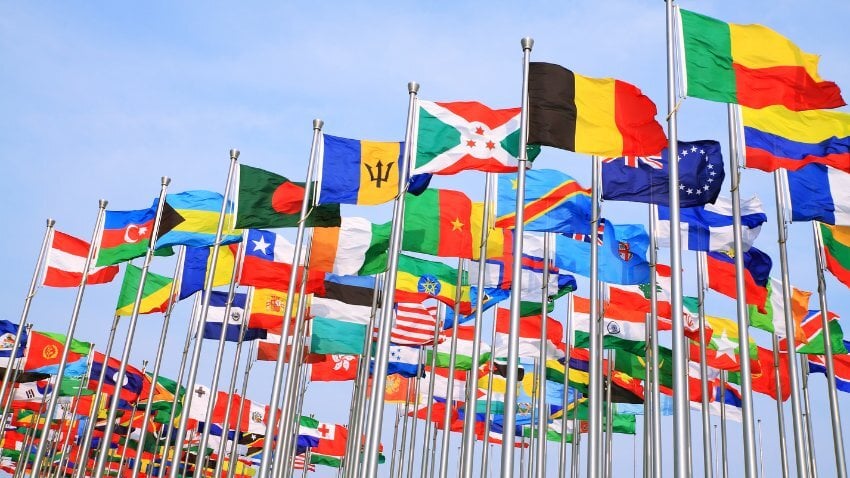
Wealth doesn’t always equal opportunity. The richest nations can be costly, restrictive, or unstable. Real freedom lies where life is affordable, modern, and secure
Being one of the richest countries in the world doesn’t automatically make a place attractive for expats or international investors. Wealthy Western nations are often overregulated and overtaxed, stifling economic liberty while entangled in prolonged political conflicts that show no signs of resolution.
Oil- and gas-rich states may offer little or no taxation. However, they usually come with endemic political risks and restrictions on personal freedoms. Island nations, meanwhile, promise plenty but often cater to very particular lifestyles, and the cost of living may not be worth the opportunities they provide.
You absolutely don’t have to live in one of the richest countries to maintain your lifestyle. In fact, there are many places where life is far more affordable, with modern amenities, solid infrastructure, and real tax advantages—without the political polarization or economic instability. If you’re concerned about your future and don’t know where to begin, start with our free special report on Plan-B Residencies & Instant Citizenships.
If you want the best intel from the expat world, including profitable offshore opportunities, little-known tax-saving strategies, and hard-won insights on immigration, passports, and Plan-B residencies, all delivered to your inbox every single week, then join our daily correspondence, EMS Pulse®. Currently enjoyed by over 84,000 expats and expat-hopefuls worldwide. Fill in the form below to join our newsletter free:

Written by Mikkel Thorup
Mikkel Thorup is the world’s most sought-after expat consultant. He focuses on helping high-net-worth private clients to legally mitigate tax liabilities, obtain a second residency and citizenship, and assemble a portfolio of foreign investments including international real estate, timber plantations, agricultural land and other hard-money tangible assets. Mikkel is the Founder and CEO at Expat Money®, a private consulting firm started in 2017. He hosts the popular weekly podcast, the Expat Money Show, and wrote the definitive #1-Best Selling book Expat Secrets - How To Pay Zero Taxes, Live Overseas And Make Giant Piles Of Money, and his second book: Expats Guide On Moving To Mexico.

Mexico remains one of Latin America’s most compelling destinations, especially for North Americans. More than a million expats call it home, and tens...

South Korea is far more than K-pop and K-dramas. It is a country known for outstanding food, from bustling street markets to high-end dining, as well...
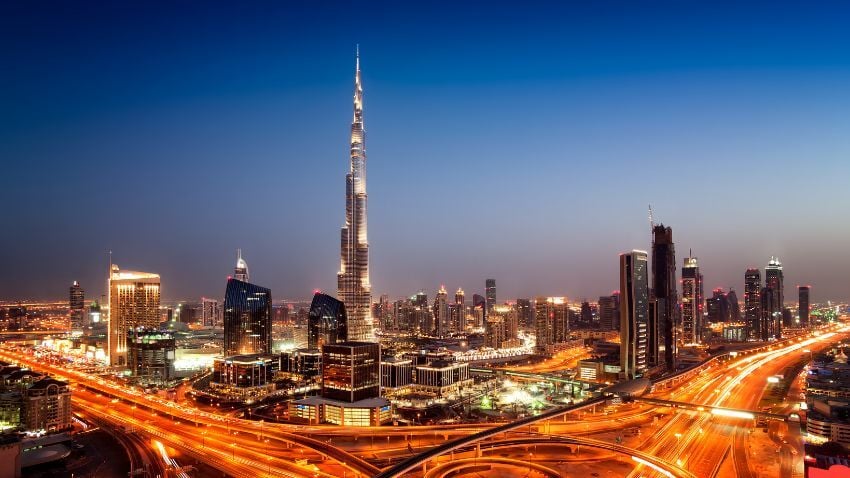
Asia is one of the most fascinating regions in the world for travel, offering an extraordinary mix of cultures, histories, and landscapes. From...